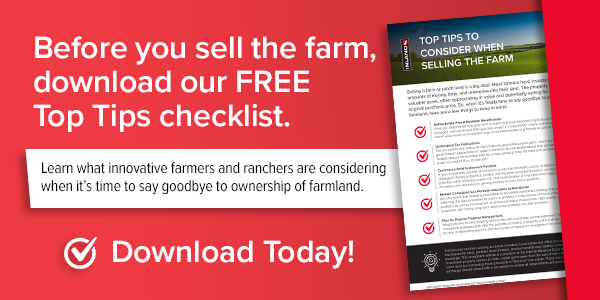Proposed Legislative Changes Might Change Your Planning
If you don’t have an heir prepared to continue your farm operations or are considering selling your farmland, there are tax implications you need to be aware of that can impact your property sale. We strongly recommend you work closely with your tax professional and attorney regarding your plans, as they can provide insight and counsel to help you make a fully informed decision.
In this post, we highlight a potential change to the tax code that could influence how you structure the sale of your farm. First, it is important to know that President Biden has proposed legislation to Congress that would require significant investments in our country’s infrastructure, social programs, and energy grid. These programs need funding. The administration has recommended several changes to the tax code, including changes to the capital gains tax that could affect how your farm is valued and the net proceeds you may receive.
As currently written, the Internal Revenue Code requires taxpayers to pay capital gains tax upon the appreciated value of an asset sale. For farmers, those assets include land, breeding livestock, buildings, and timber. Since many farms have been held in families for generations, appreciated values can easily reach millions, exposing the farmer to significant capital gains tax.
Potential Capital Gains Tax Changes
President Biden’s Build Back Better Act currently proposes increasing the long-term capital gains tax rate from 20% to 25% for households with modified adjusted gross income over $5 million.1 Many farmers could reach that threshold when selling their farms, while others who own larger farms and ranches may gross more. This is because capital gains are included in taxable income (although often taxed at a lower rate). So, the sale of farmland that has been held in a family for many years could generate several million dollars in reportable “income” for the farmer.
With an imminent tax bill likely to come due when your farm sells, is there anything you can do to minimize your tax obligation? Fortunately, there is.
Consider a 1031 Exchange to Defer Capital Gains Tax
Section 1031 of the Internal Revenue Code allows taxpayers to defer capital gains tax when selling investment property (of which farms are included) and investing the sale proceeds in a “like-kind” replacement property. The term like-kind has a fairly broad definition and does not mean you need to buy another farm. For example, you can purchase a retail store, apartment complex, office building, or self-storage facility – or interests in these asset classes.
The key is: 1031 exchanges enable you to sell your farm and reinvest in another income-producing property while deferring capital gains tax. This means you can put the entire proceeds of your sale to work when purchasing a replacement property, which may generate a retirement income stream.
The Delaware Statutory Trust Option
Farmers who use a 1031 exchange to sell their farms often use the Delaware Statutory Trust (DST) structure. While the tax-deferral advantages of the 1031 exchange are appealing, many farmers, after decades of hard work, don’t have much desire to manage another property – regardless of the type. That is where a DST comes into play.
Interests in a DST qualify as “like-kind” property under 1031 exchange rules and offers the advantage of passive ownership. Investors own fractional interests in a DST, which owns institutional-quality property typically managed by experienced, professional teams. This passive investment structure frees investors from dealing with leasing, management, and maintenance hassles, while still potentially receiving investment income.
We will discuss the DST in greater detail in a future blog post. But if you would like to learn more now about the securitized 1031 exchange industry leader, Inland Private Capital Corporation, fill out the form on the contact us page, and a representative will call you soon. We work with financial professionals across the country to help farmers defer capital gains taxes when selling a family farm.
1https://www.barrons.com/articles/big-tax-changes-are-brewing-what-you-need-to-know-51632269044
